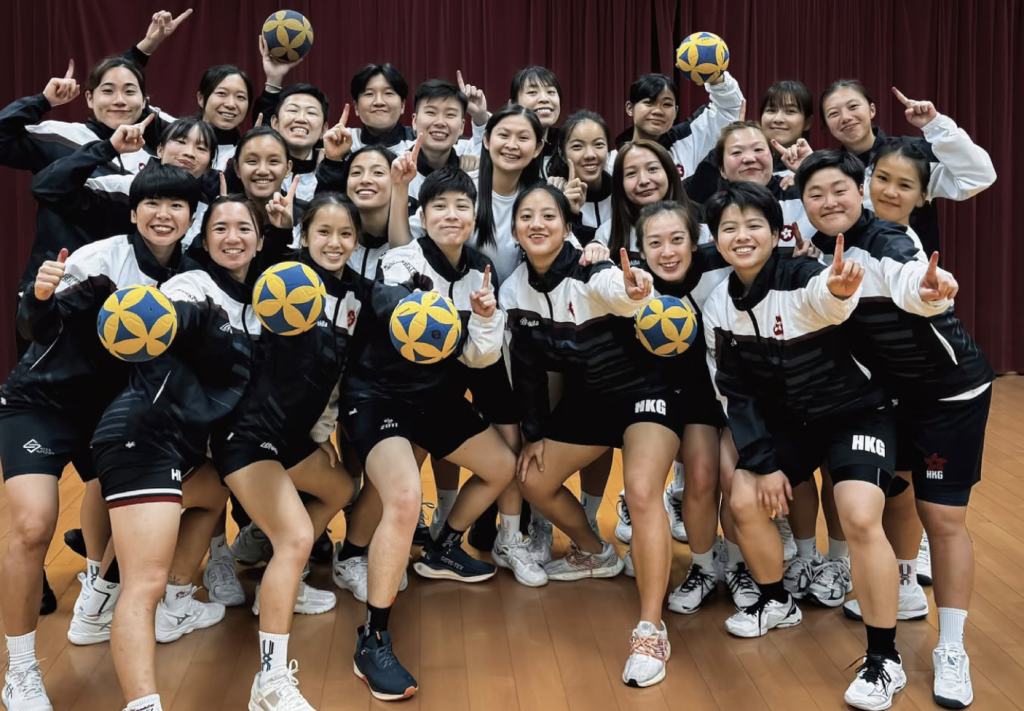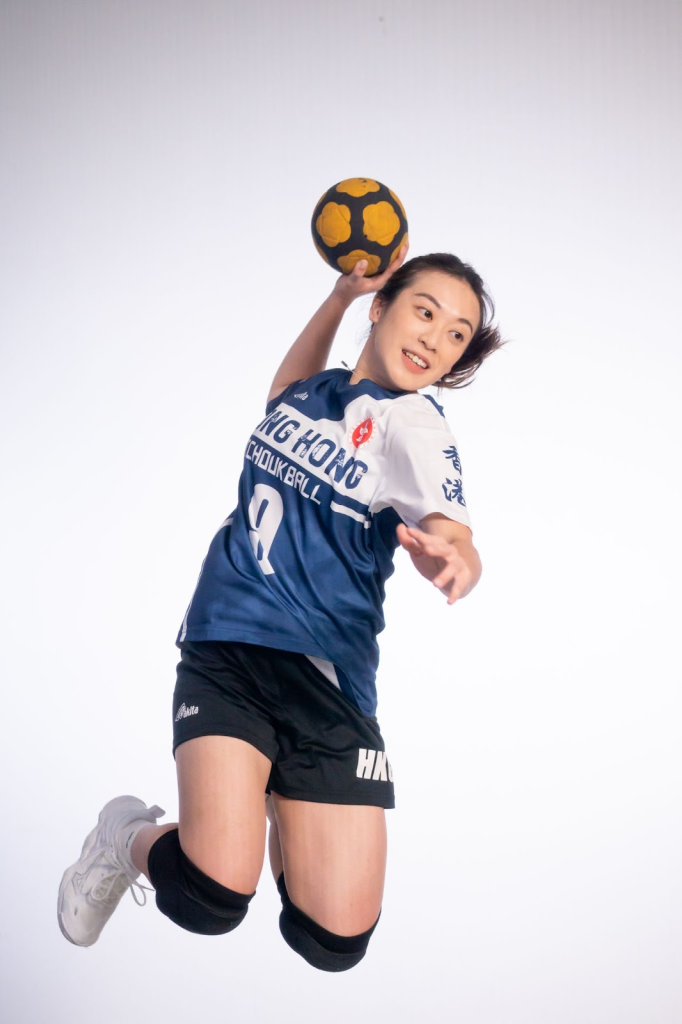Tchoukball is gradually gaining attention as a sport. Recently, BBOLD editors invited the coach of the Hong Kong women’s tchoukball team, Ng Tsz-lai, and team captain Candy to share their passion for the sport and their growth experiences.
Tchoukball is a ball game played with a rebound net, which measures approximately one meter by one meter. Players need to throw the ball onto the net so that it rebounds into the opponent’s area. This sport was invented by Swiss biologist Hermann Brandt in the 1970s and is a non-contact sport. The name “Tchoukball” comes from the sound the ball makes when it hits the net, which resembles the French word “tchouk.” In Chinese, it is phonetically translated as “巧固球”.
The basic gameplay involves players shooting the ball from a 3-meter semi-circular zone. If the ball rebounds out of the zone and lands in the playing area without being caught by an opposing player, a point is scored. During the game, players cannot intercept the opponent’s ball or obstruct their passing or shooting. For this reason, Candy describes tchoukball as a “gentleman’s game.”
Coach Ng Tsz-Li began her journey with tchoukball in 2006. After years of hard work and training, she became a coach in 2019. Initially, she played handball and beach handball, but her coaches introduced her to tchoukball, allowing her to be among the first to engage with this sport. Over time, she became a coach for both handball and tchoukball.

Tchoukball was a new sport introduced about twelve years ago, and at that time, very few people in Hong Kong knew how to play. Ng mentioned, “Back then, even though we had so-called coaches, they were really just our teammates. We practiced together every day for a week during the summer. We never felt tired because it was so much fun. Just think about it—how many sports in Hong Kong allow you to develop your own playing techniques? Almost none.”
During her teaching process, she gradually discovered that students who enjoy handball and tchoukball have different personalities. She noted, “Some students only like handball because it’s exciting with body contact, and they can score immediately. I would describe them as more aggressive. But there are others who dislike handball and are afraid of contact; they really enjoy playing tchoukball.” She realized that every sport attracts different types of people. The unique feature of this sport is that it combines the throwing mechanics of handball with the rebounding actions of volleyball, requiring players to have not only good technical skills but also quick reflexes.
Using her personal experience as an example, she added, “I have participated in international beach handball competitions and represented Hong Kong. After the matches, I couldn’t become friends with the opponents because, after physical contact, you remember when they pushed or hit you on the court, which can affect your mood.”

Candy is the captain of the Hong Kong women’s tchoukball team and has been playing the sport for twelve years. She was previously a teammate of Coach Ng and is known as the team’s number nine, specializing in the left attacking position. Candy states that the pace of tchoukball is very fast; after shooting the ball, players must immediately prepare for defense. This quick transition between offense and defense makes the game exciting.
Candy mentioned that she began getting involved in tchoukball while preparing for her DSE exams. At that time, she was playing volleyball, but her volleyball coach suggested she switch to tchoukball, as there were better development opportunities in this sport. She decided to give it a try, and as a result, she represented the Hong Kong team at the Asian Cup during her first competition, which ignited her passion for tchoukball.

Faced frequent rejections on booking venue
As a new sport emerges, one of the challenges for its development in Hong Kong inevitably revolves around the issue of space. When editor Michelle asked how they initially found training venues, the coach smiled with a sense of helplessness and deep meaning, saying, “I might cry when talking about this… We have always relied on borrowing school facilities. Often, we depend on teammates who are teachers to approach the school or principals for permission. The schools are very supportive, but their facilities are subject to weather restrictions, making it difficult to practice consistently. So, we tried to book venues from the Leisure and Cultural Services Department.”
The option to book these venues was a touching attempt for them, but to their surprise, when trying to reserve a space for tchoukball, they first had to “book a basketball court” and then “pay to change the usage” in order to officially practice tchoukball. This process required more effort and money than typical sports. Before they could pay to change the usage, they had also tried to book a basketball court for tchoukball practice, but the staff insisted that they needed to “frame” their practice as “part of basketball drills.” Tsz-lai recalls that this reasoning was more offensive than any curse word, as everyone knew it was a lie, but the goal was simply to practice tchoukball.

By 2024, during their competition activities, they attempted to “grab” any available basketball court for temporary rental, only to be told, “Your sport is not a recognized sport.” The staff insisted that even if they paid extra, they still wouldn’t be allowed to play tchoukball. Throughout this period, they faced prolonged rejections and had to keep changing venues, searching for a way to sustain their practice of tchoukball. Tsz-lai described this experience as quite arduous.
This raises further questions about how new sports can effectively develop and keep pace with international standards in a small city like Hong Kong. How can the government improve existing systems to help more emerging niche sports survive in Hong Kong? As ordinary citizens, we can choose to understand, pay attention to, and support athletes, promoting tchoukball one step at a time, which we believe is the greatest support we can offer.
The spirit of perseverance
For twelve years, tchoukball has presented numerous challenges, whether in daily practice or competitions. What keeps these athletes going? What is the main factor that allows them to persist? Captain Candy says, “I believe it’s absolutely related to our character. Our entire team refuses to be underestimated; we have a competitive spirit and a determination to win.”
They also reflected on their journey, sharing the hardships they have faced. During the World Cup, they achieved fourth place, which made them feel that their long preparation had finally been validated, proving that their efforts were not in vain. The coach shared with Candy, “Every failure is an opportunity for us to learn, and it relies on everyone’s effort and determination not to give up. If you ask about a defining characteristic of our team, it’s that no one gives up.”
This year, they proudly represented Hong Kong and won first place in Asia, a testament to their hard work. They have invested a lot of effort a


